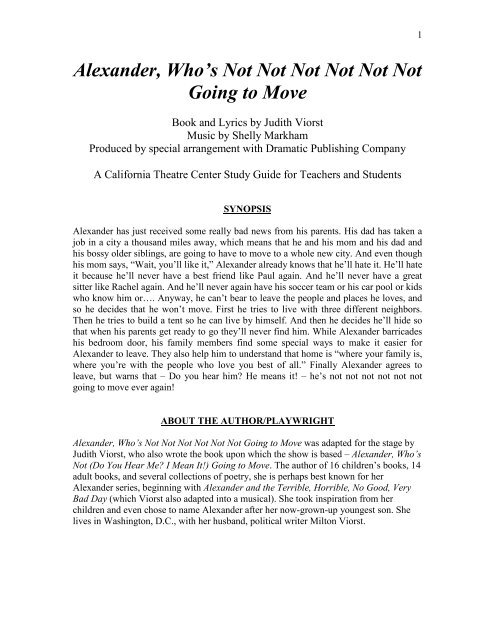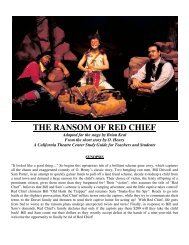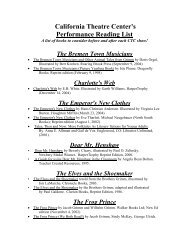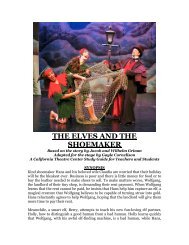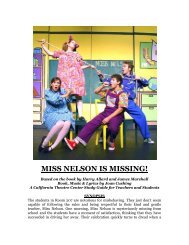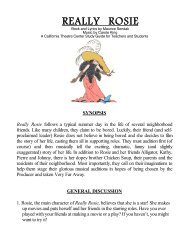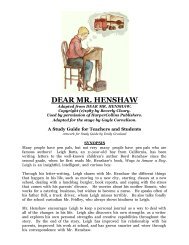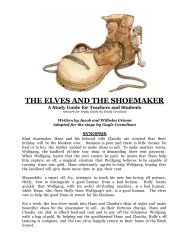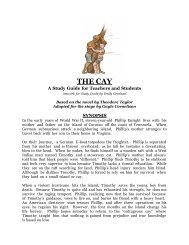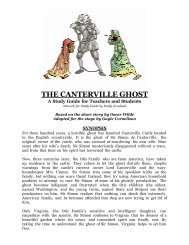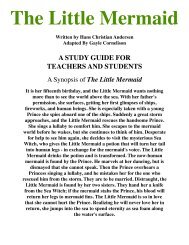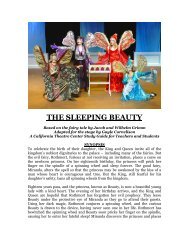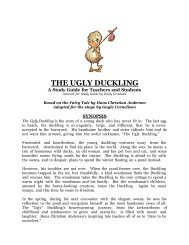Alexander, Who's Not Not Not Not Not Not Going to Move
Alexander, Who's Not Not Not Not Not Not Going to Move
Alexander, Who's Not Not Not Not Not Not Going to Move
You also want an ePaper? Increase the reach of your titles
YUMPU automatically turns print PDFs into web optimized ePapers that Google loves.
<strong>Alexander</strong>, Who’s <strong>Not</strong> <strong>Not</strong> <strong>Not</strong> <strong>Not</strong> <strong>Not</strong> <strong>Not</strong><br />
<strong>Going</strong> <strong>to</strong> <strong>Move</strong><br />
Book and Lyrics by Judith Viorst<br />
Music by Shelly Markham<br />
Produced by special arrangement with Dramatic Publishing Company<br />
A California Theatre Center Study Guide for Teachers and Students<br />
1<br />
SYNOPSIS<br />
<strong>Alexander</strong> has just received some really bad news from his parents. His dad has taken a<br />
job in a city a thousand miles away, which means that he and his mom and his dad and<br />
his bossy older siblings, are going <strong>to</strong> have <strong>to</strong> move <strong>to</strong> a whole new city. And even though<br />
his mom says, “Wait, you’ll like it,” <strong>Alexander</strong> already knows that he’ll hate it. He’ll hate<br />
it because he’ll never have a best friend like Paul again. And he’ll never have a great<br />
sitter like Rachel again. And he’ll never again have his soccer team or his car pool or kids<br />
who know him or…. Anyway, he can’t bear <strong>to</strong> leave the people and places he loves, and<br />
so he decides that he won’t move. First he tries <strong>to</strong> live with three different neighbors.<br />
Then he tries <strong>to</strong> build a tent so he can live by himself. And then he decides he’ll hide so<br />
that when his parents get ready <strong>to</strong> go they’ll never find him. While <strong>Alexander</strong> barricades<br />
his bedroom door, his family members find some special ways <strong>to</strong> make it easier for<br />
<strong>Alexander</strong> <strong>to</strong> leave. They also help him <strong>to</strong> understand that home is “where your family is,<br />
where you’re with the people who love you best of all.” Finally <strong>Alexander</strong> agrees <strong>to</strong><br />
leave, but warns that – Do you hear him? He means it! – he’s not not not not not not<br />
going <strong>to</strong> move ever again!<br />
ABOUT THE AUTHOR/PLAYWRIGHT<br />
<strong>Alexander</strong>, Who’s <strong>Not</strong> <strong>Not</strong> <strong>Not</strong> <strong>Not</strong> <strong>Not</strong> <strong>Not</strong> <strong>Going</strong> <strong>to</strong> <strong>Move</strong> was adapted for the stage by<br />
Judith Viorst, who also wrote the book upon which the show is based – <strong>Alexander</strong>, Who’s<br />
<strong>Not</strong> (Do You Hear Me? I Mean It!) <strong>Going</strong> <strong>to</strong> <strong>Move</strong>. The author of 16 children’s books, 14<br />
adult books, and several collections of poetry, she is perhaps best known for her<br />
<strong>Alexander</strong> series, beginning with <strong>Alexander</strong> and the Terrible, Horrible, No Good, Very<br />
Bad Day (which Viorst also adapted in<strong>to</strong> a musical). She <strong>to</strong>ok inspiration from her<br />
children and even chose <strong>to</strong> name <strong>Alexander</strong> after her now-grown-up youngest son. She<br />
lives in Washing<strong>to</strong>n, D.C., with her husband, political writer Mil<strong>to</strong>n Viorst.
2<br />
GENERAL DISCUSSION<br />
1. How does <strong>Alexander</strong> react when he finds out his family is moving? Why does he<br />
feel this way? Think of a time when you had <strong>to</strong> go through a sudden change or<br />
transition in your life. Were you scared or upset? How did you deal with these<br />
feelings?<br />
2. What does <strong>Alexander</strong> do when he’s trying <strong>to</strong> avoid moving? What might you<br />
have done differently if you were in his situation?<br />
3. If you were a friend of <strong>Alexander</strong>’s, what might you say <strong>to</strong> him <strong>to</strong> help him feel<br />
better about moving?<br />
4. Why does <strong>Alexander</strong> change his mind about moving? How do his parents help<br />
him? Do you think <strong>Alexander</strong> will be happy in his new home?<br />
CREATIVE WRITING<br />
1. Think about a time when you had <strong>to</strong> go through a big change – maybe you moved<br />
<strong>to</strong> a new house, started at a new school, or had a new baby brother or sister. Were<br />
you scared? Excited? Write a letter <strong>to</strong> <strong>Alexander</strong>, telling him about the big<br />
change, how it made you feel at the time, and how you feel about it now. You<br />
could give <strong>Alexander</strong> advice about how best <strong>to</strong> adjust <strong>to</strong> his new life.<br />
2. Imagine that you are <strong>Alexander</strong> and your parents have just <strong>to</strong>ld you that you are<br />
going <strong>to</strong> have <strong>to</strong> move. What is going through your head? How does this make<br />
you feel? Are you going <strong>to</strong> try <strong>to</strong> s<strong>to</strong>p the move from happening? Write a journal<br />
entry about your feelings and then write about what you plan <strong>to</strong> do in the future.<br />
3. At the end of the play, <strong>Alexander</strong> finally accepts the fact that he is moving and<br />
begins <strong>to</strong> get excited about his new home, his new school, and particularly his<br />
new dog! Write a sequel <strong>to</strong> the play we saw <strong>to</strong>day (you may choose <strong>to</strong> write it as a<br />
play or as a s<strong>to</strong>ry), talking about <strong>Alexander</strong>’s new life and what happens <strong>to</strong> him<br />
next.<br />
LITERATURE/LANGUAGE ARTS<br />
1. Have the students read Judith Viorst’s <strong>Alexander</strong>, Who’s <strong>Not</strong> (Do You Hear Me? I<br />
Mean It!) <strong>Going</strong> <strong>to</strong> <strong>Move</strong> – the book upon which this musical is based. Compare<br />
and contrast the two versions. What is similar? Is there anything in the book that<br />
isn’t in the play? Did the author add anything <strong>to</strong> the play that isn’t in the book?
3<br />
VISUAL ARTS<br />
1. Pick your favorite scene from the play and draw a picture of it. Feel free <strong>to</strong> be<br />
creative – the set and costumes don’t have <strong>to</strong> look the same as the ones that were<br />
used in the production. How can you show what’s happening during this<br />
particular scene using only pictures? Can you show how the characters are feeling<br />
by the expressions on their faces?<br />
2. Draw a picture of what <strong>Alexander</strong>’s new home might look like. Include<br />
<strong>Alexander</strong>’s new house, his new friends and, of course, his brand-new dog!<br />
DRAMATIC ARTS<br />
1. What is a play, and how is it different from a book or a movie? You might wish <strong>to</strong><br />
discuss the following terms: stage, musical play, ac<strong>to</strong>r, character, set, costumes,<br />
props, audience.<br />
2. <strong>Alexander</strong>, Who’s <strong>Not</strong> <strong>Not</strong> <strong>Not</strong> <strong>Not</strong> <strong>Not</strong> <strong>Not</strong> <strong>Going</strong> <strong>to</strong> <strong>Move</strong> is a musical, which<br />
means that the characters sing and dance during the show. In what ways are song<br />
and dance used <strong>to</strong> help tell the s<strong>to</strong>ry? What do these musical numbers add <strong>to</strong> your<br />
experience of the play?<br />
3. What are the differences between watching a live play and watching a movie?<br />
Why is it important that, as an audience, we are quiet and respectful?<br />
4. Most of the ac<strong>to</strong>rs onstage play a wide variety of characters, some of them very<br />
different from one another. What changes did the ac<strong>to</strong>rs make when they switched<br />
from one character <strong>to</strong> the next? Did they change their voices or the way they<br />
walked or moved? How did the costumes help make the characters different?<br />
5. Take some time <strong>to</strong> create your own characters. Come up with someone in your<br />
head (or have your teacher assign you a character) and walk around the room,<br />
talking and moving the way you think that character would talk and move. Now<br />
pick a different character. How can you speak and move in a way that makes you<br />
seem like an entirely different person or animal?<br />
6. The play features a wide variety of locations, but the set is fairly simple, often<br />
using a few pieces <strong>to</strong> create an entirely new setting. What special techniques did<br />
the play use <strong>to</strong> portray <strong>Alexander</strong>’s house, the houses of his neighbors, the s<strong>to</strong>re,<br />
and the dry cleaner’s? Were they able <strong>to</strong> make it believable that the characters<br />
were in that location?
4<br />
SCIENCE<br />
1. The characters keep mentioning a time when <strong>Alexander</strong> accidentally <strong>to</strong>uched<br />
poison ivy. What is poison ivy, and why does it make you so itchy when you<br />
<strong>to</strong>uch it? How is it different from other poisonous plants (poison oak, poison<br />
sumac, etc.) Talk about what poison ivy looks like and how you can avoid it.<br />
2. <strong>Alexander</strong> makes the mistake of hiding in a big barrel that’s intended for pickle<br />
juice. What are pickles, and how are they made? Talk about the process of turning<br />
a cucumber in<strong>to</strong> a pickle. Is it possible for other kinds of food <strong>to</strong> go through a<br />
pickling process?<br />
LIFE SKILLS<br />
1. <strong>Alexander</strong> tries <strong>to</strong> set up a tent and finds that the job is a lot harder than he<br />
expected! Talk about how tents work and how you set them up. What is the<br />
his<strong>to</strong>ry of tents? How have tents changed over the years?<br />
READING SUGGESTIONS<br />
1. <strong>Alexander</strong>, Who’s <strong>Not</strong> (Do You Hear Me? I Mean It!) <strong>Going</strong> <strong>to</strong> <strong>Move</strong>, by Judith<br />
Viorst, illustrated by Robin Preiss Glasser “in the style of Ray Cruz.” Atheneum<br />
Books, 1995.<br />
2. <strong>Alexander</strong> and the Terrible, Horrible, No Good, Very Bad Day, by Judith Viorst,<br />
illustrated by Ray Cruz. Atheneum Books, 1972.<br />
3. <strong>Alexander</strong>, Who Used <strong>to</strong> Be Rich Last Sunday, by Judith Viorst, illustrated by Ray<br />
Cruz. Atheneum Books, 1977.<br />
4. “If I Were in Charge of the World,” by Judith Viorst. See the poem at the end of<br />
this study guide.<br />
WRITE TO CTC!<br />
After watching the play, write us a letter about it. Tell us what you liked or disliked about<br />
the s<strong>to</strong>ry, the characters, costumes, set, or anything else you observed. Support your<br />
thoughts with examples and reasons. (Teachers’ comments are also appreciated!)<br />
Mail <strong>to</strong>:<br />
CTC<br />
P.O. Box 2007<br />
Sunnyvale, CA 94087
5<br />
If I Were in Charge of the World<br />
by Judith Viorst<br />
If I were in charge of the world<br />
I’d cancel oatmeal,<br />
Monday mornings,<br />
Allergy shots, and also Sara Steinberg.<br />
If I were in charge of the world<br />
There’d be brighter nights lights,<br />
Healthier hamsters, and<br />
Basketball baskets forty eight inches lower.<br />
If I were in charge of the world<br />
You wouldn’t have lonely.<br />
You wouldn’t have clean.<br />
You wouldn’t have bedtimes.<br />
Or “Don’t punch your sister.”<br />
You wouldn’t even have sisters.<br />
If I were in charge of the world<br />
A chocolate sundae with whipped cream and nuts would be a vegetable,<br />
All 007 movies would be G,<br />
And a person who sometimes forgot <strong>to</strong> brush,<br />
And sometimes forgot <strong>to</strong> flush,<br />
Would still be allowed <strong>to</strong> be<br />
In charge of the world.


